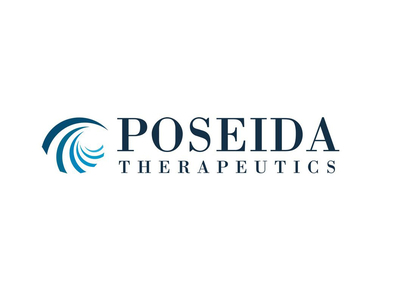Poseida Therapeutics Provides Update on Phase 1 Trial of P-BCMA-101 at the 2020 American Society of Hematology Annual Meeting
"Based on the dual benefits of improved efficacy and consistent safety demonstrated with the new nanoplasmid, we are moving forward with this optimized manufacturing method in all of our CAR-T programs," said
The Phase 1 dose escalation trial initially included five cohorts with a product candidate created using a standard plasmid process. The trial was expanded in 2020 to include cohorts utilizing a new nanoplasmid manufacturing process. The nanoplasmid technology allows for a reduction in the plasmid backbone size, enhancing the transposition efficiency during manufacturing and improving the final CAR-T product performance. The expansion part of the trial is also evaluating several novel dosing strategies with 19 patients treated as of the data cutoff with a variety of dosing regimens, including single administration, cyclic dosing, combination with rituximab, and combination with lenalidomide.
Using the new manufacturing process, a dose of 0.75 x 106 cells/kg was administered to eight patients in the initial P-BCMA-101 nanoplasmid expansion cohorts. Patients treated in this cohort and evaluable by
"We observed an excellent efficacy and safety profile with a single dose escalation. There were very low rates of CRS with no ICU admissions for CRS, resulting in a safety profile suggesting this therapy could be delivered to a greater number of patients in a community hospital or outpatient setting," said
At the 0.75 x 106 cells/kg dose, cytokine release syndrome (CRS) was seen in just one, or 12.5%, of evaluable Phase 1 nanoplasmid patients (n=8) and neurotoxicity was not seen in any patients, demonstrating the preservation of the product safety profile within the expansion cohort. The Company believes this highly favorable safety profile can be attributed to the gradual expansion of stem cell memory T (Tscm) cells when compared with published data from competitor products comprised of a higher percentage of T effector and other differentiated T cells (2-3 weeks to peak versus 3-7 days for most CAR-T cells). There have been no patient deaths, dose limiting toxicities or unexpected/off-target toxicities related to P-BCMA-101. The most common adverse events were cytopenias and infections generally attributable to lymphodepleting chemotherapy regimens. Based on the safety results, the protocol was amended to allow fully outpatient CAR-T cell administration.
The median patient age was 60, with a median time since diagnosis of approximately five years. Patients were heavily pre-treated, with a median of eight prior lines of therapy (2-18). All patients had received a protease inhibitor or at least one IMid, and nearly all patients had been previously treated with a CD38 monoclonal antibody. Sixty percent of the patients were refractory to all three drug classes, and four patients had previously received an anti-BCMA targeted therapy.
This open label, multicenter Phase 1 study is designed to assess the safety of P-BCMA-101 in subjects with relapsed and/or refractory multiple myeloma and includes multiple exploratory cohorts to evaluate the administration of P-BCMA-101 CAR-T within the framework of moving from the standard plasmid CAR-T product to the nanoplasmid product. The primary objective of this study is to determine the safety and maximum-tolerated dose of P-BCMA-101. Secondary objectives include anti-myeloma effect of P-BCMA-101. Additional information about the Phase 1 clinical study of P-BCMA-101 is available at www.clinicaltrials.gov using identifier: NCT03288493.
About P-BCMA-101
P-BCMA-101 is an autologous CAR-T therapy which is currently being evaluated in an expanded Phase 1 clinical trial for the treatment of patients with relapsed/refractory multiple myeloma to inform the potentially registrational Phase 2 clinical trial. P-BCMA-101 targets cells that express B cell maturation antigen, or BCMA, which is expressed on essentially all multiple myeloma cells. P-BCMA-101 is engineered with
About
Forward-Looking Statements
Statements contained in this press release regarding matters that are not historical facts are "forward-looking statements" within the meaning of the Private Securities Litigation Reform Act of 1995. Such forward-looking statements include statements regarding the clinical data presented, the potential benefits of Poseida's technology platforms and product candidates and Poseida's plans and strategy with respect to developing its technologies and product candidates. Because such statements are subject to risks and uncertainties, actual results may differ materially from those expressed or implied by such forward-looking statements. These forward-looking statements are based upon Poseida's current expectations and involve assumptions that may never materialize or may prove to be incorrect. Actual results could differ materially from those anticipated in such forward-looking statements as a result of various risks and uncertainties, which include, without limitation, risks and uncertainties associated with development and regulatory approval of novel product candidates in the biopharmaceutical industry, the fact that future clinical results could be inconsistent with results observed to date and the other risks described in Poseida's filings with the Securities and Exchange Commission. All forward-looking statements contained in this press release speak only as of the date on which they were made. Poseida undertakes no obligation to update such statements to reflect events that occur or circumstances that exist after the date on which they were made, except as required by law.
![]() View original content to download multimedia:http://www.prnewswire.com/news-releases/poseida-therapeutics-provides-update-on-phase-1-trial-of-p-bcma-101-at-the-2020-american-society-of-hematology-annual-meeting-301186752.html
View original content to download multimedia:http://www.prnewswire.com/news-releases/poseida-therapeutics-provides-update-on-phase-1-trial-of-p-bcma-101-at-the-2020-american-society-of-hematology-annual-meeting-301186752.html
SOURCE
mgraham@poseida.com or kgallagher@lavoiehealthscience.com


